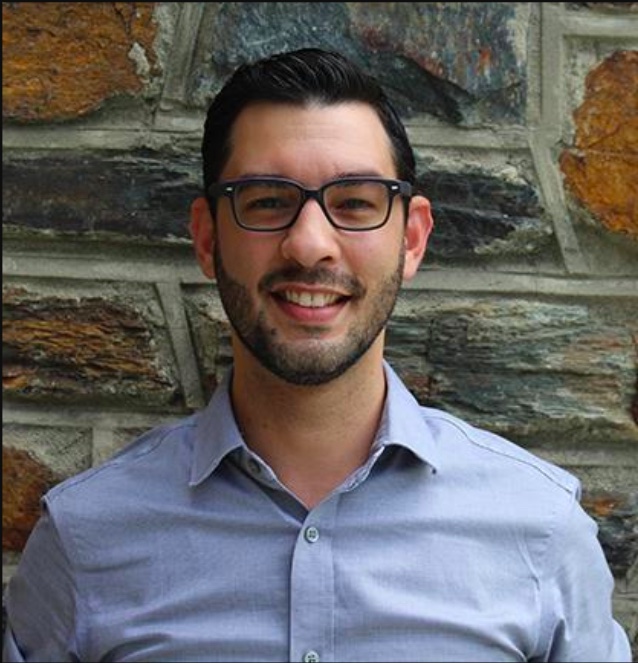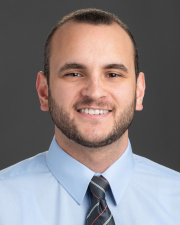CaDRE Award Winners
2022-2023
Edison Leung, MD
 Edison is a PGY 4 Research Track Resident. His research studies focus on the systematic changes that occur in co-misuse of alcohol and opioids. The goal of his CADRE Program project titled “Determining the mechanistic and neurocircuitry changes in co-misuse of alcohol and opioid use disorders compared to mono-misuse of alcohol or opioids” is to examine in post-mortem samples, the transcriptomic, proteomic, epigenetic, and neurocircuitry changes that occur in co-misusers of alcohol and opioids compared to mono-misusers of those substances as well as to link those changes to the accompanying psychological autopsy.
Edison is a PGY 4 Research Track Resident. His research studies focus on the systematic changes that occur in co-misuse of alcohol and opioids. The goal of his CADRE Program project titled “Determining the mechanistic and neurocircuitry changes in co-misuse of alcohol and opioid use disorders compared to mono-misuse of alcohol or opioids” is to examine in post-mortem samples, the transcriptomic, proteomic, epigenetic, and neurocircuitry changes that occur in co-misusers of alcohol and opioids compared to mono-misusers of those substances as well as to link those changes to the accompanying psychological autopsy.
Heather E. Webber, PhD
 Heather is an Instructor (research faculty) at the Center for Neurobehavioral Research. Dr. Webber primarily employs human electrophysiological methods to study the underlying neural mechanisms of motivation, reward and punishment sensitivity, and emotional functioning and how these processes contribute to addiction. In the CaDRE project titled “Identifying Electrophysiological Targets for Transcranial Magnetic Stimulation for Cocaine Use Disorder”, she will assess the effects of brain stimulation to the dorsomedial prefrontal cortex (compared to sham stimulation) on electroencephalogram markers of reward functioning in individuals with cocaine use disorder.
Heather is an Instructor (research faculty) at the Center for Neurobehavioral Research. Dr. Webber primarily employs human electrophysiological methods to study the underlying neural mechanisms of motivation, reward and punishment sensitivity, and emotional functioning and how these processes contribute to addiction. In the CaDRE project titled “Identifying Electrophysiological Targets for Transcranial Magnetic Stimulation for Cocaine Use Disorder”, she will assess the effects of brain stimulation to the dorsomedial prefrontal cortex (compared to sham stimulation) on electroencephalogram markers of reward functioning in individuals with cocaine use disorder.
Camila Lima, PhD
 Camila is a Post-Doctoral Fellow at the Faillace Department of Psychiatry and Behavioral Sciences. Her research interests, underlying her work for the past ten years, have been largely focused on understanding the pathways and biological mechanisms underlying bipolar disorder pathophysiology and its treatment. In the CaDRE Program award, she will conduct the study “Prenatal COVID-19 Exposure and Epigenetic Aging: Implications for pediatric neurocognitive development”.
Camila is a Post-Doctoral Fellow at the Faillace Department of Psychiatry and Behavioral Sciences. Her research interests, underlying her work for the past ten years, have been largely focused on understanding the pathways and biological mechanisms underlying bipolar disorder pathophysiology and its treatment. In the CaDRE Program award, she will conduct the study “Prenatal COVID-19 Exposure and Epigenetic Aging: Implications for pediatric neurocognitive development”.
Vijayasree Giridharan, PhD
 Vijayasree is a Post-Doctoral Fellow at the Faillace Department of Psychiatry and Behavioral Sciences. Dr. Giridharan’s long-term goal is to understand the pathophysiology of neuropsychiatric disorders that will help develop treatment strategies. Currently, she is investigating the infection-induced long-term behavioral outcome in experimental models. In the CaDRE program project titled “Influence of Post COVID-19 on neuropsychiatric complications”, she will study the role of gut microbiome and inflammation on long COVID-induced neuropsychiatric sequelae.
Vijayasree is a Post-Doctoral Fellow at the Faillace Department of Psychiatry and Behavioral Sciences. Dr. Giridharan’s long-term goal is to understand the pathophysiology of neuropsychiatric disorders that will help develop treatment strategies. Currently, she is investigating the infection-induced long-term behavioral outcome in experimental models. In the CaDRE program project titled “Influence of Post COVID-19 on neuropsychiatric complications”, she will study the role of gut microbiome and inflammation on long COVID-induced neuropsychiatric sequelae.
2023-2024
Samuel Marsan, M.A.

Sam (he/él) is a psychology intern at UTHealth Doctoral Psychology Internship Program (UTHDPIP). As a psychology intern from Duke University, Sam is the first predoctoral trainee to receive the CaDRE award. His CaDRE project seeks to build upon his dissertation topic and aims to develop a comprehensive self-report measure of Body-Image-related Quality of Life for Transgender Adolescents (BIQoL-TA). This project relies on mixed methods that encompass Applied Thematic Analysis (ATA) and Structural Equation Modeling (SEM) approaches for psychometric validation. The CaDRE award resourced Sam not only with a mentorship team of experts, but also with the opportunity to expand recruitment and research compensation of this hard-to-reach population. A successfully validated BIQoL-TA may have implications in enhancing the informed consent process for gender affirming medical treatments. What’s more, it may enable transgender adolescents and their caregivers to consider the potential risks and benefits of medical interventions as well as potential gains and losses to their quality of life. Moreover, this tool may expand medical providers’ understanding of gender affirming treatment outcomes that consider body-image-related quality of life on par with biological function outcomes.
Rafaela C. Cordeiro, PhD

Rafaela is a Post-Doctoral Fellow at the Faillace Department of Psychiatry and Behavioral Sciences. Her research focuses on translating basic research discoveries into clinical applications for bipolar disorder biomarkers. By merging neurocognitive and clinical data with multi-omics information, including transcriptomics, proteomics, and metabolomics, Dr. Cordeiro aims to pinpoint microglial biosignatures with the potential to predict clinical and cognitive outcomes. Her long-term goal is to facilitate early detection and intervention in bipolar disorder, ultimately enhancing the well-being and development of affected children. In the CaDRE program project titled “Metabolic and Inflammatory Pathways Involved in Cognitive Impairments of Children and Adolescents with Early-Onset Bipolar Disorder and High-Risk Offspring of Bipolar Parents,” she investigates the role of inflammation in the familial risk of bipolar disorder, offering promising insights into this complex condition.
Constanza de Dios, PhD
 Constanza is an Instructor (Research Faculty) at the Center for Neurobehavioral Research on Addiction. She focuses on applied statistical analyses of clinical research data in the contexts of clinical trials and observational studies. In her CaDRE project (“Developing a prediction algorithm of aggressive incidents in a major psychiatric hospital”), she will use standard and novel machine learning models in identifying aggressive incidents routinely recorded from the electronic health record aggregated over a decade from a large inpatient community mental health hospital. This will provide feasibility data for the development of a clinical decision support tool that can guide organizational decision-making.
Constanza is an Instructor (Research Faculty) at the Center for Neurobehavioral Research on Addiction. She focuses on applied statistical analyses of clinical research data in the contexts of clinical trials and observational studies. In her CaDRE project (“Developing a prediction algorithm of aggressive incidents in a major psychiatric hospital”), she will use standard and novel machine learning models in identifying aggressive incidents routinely recorded from the electronic health record aggregated over a decade from a large inpatient community mental health hospital. This will provide feasibility data for the development of a clinical decision support tool that can guide organizational decision-making.
Andrea Boscutti, MD
 Andrea is a Postdoctoral Fellow at the Faillace Department of Psychiatry and Behavioral Sciences. His research interests include processing of medical images and employing machine learning and artificial intelligence architectures for image segmentation and treatment planning for neuromodulation interventions. In the CaDRE Program award, he will conduct the study “Magnetic Resonance Imaging-Guided Low Intensity Focused Ultrasound Stimulation Effect on Amygdala Reactivity and Functional Connectivity”.
Andrea is a Postdoctoral Fellow at the Faillace Department of Psychiatry and Behavioral Sciences. His research interests include processing of medical images and employing machine learning and artificial intelligence architectures for image segmentation and treatment planning for neuromodulation interventions. In the CaDRE Program award, he will conduct the study “Magnetic Resonance Imaging-Guided Low Intensity Focused Ultrasound Stimulation Effect on Amygdala Reactivity and Functional Connectivity”.
Antonio Pagan, PhD
 Dr. Pagán is a Post-Doctoral Fellow at the Faillace Department of Psychiatry and Behavioral Sciences. Dr. Pagán’s long-term goal is to understand the neural biomarkers of neuropsychiatric disorders that will help develop treatment strategies to improve outcomes in various underserved communities. Currently, he is adapting an intervention for Latinos with ASD and an intervention for military-dependent young adults with ASD. In the CaDRE program project titled “Pilot testing a military-culture adapted group treatment program for military-dependent, autistic young adults and their parents”, he will conduct separate focus groups with military/veteran parents of young adults with ASD and with military/veteran-dependent young adults with ASD to pilot test an adapted intervention with 20 young adults and parents.
Dr. Pagán is a Post-Doctoral Fellow at the Faillace Department of Psychiatry and Behavioral Sciences. Dr. Pagán’s long-term goal is to understand the neural biomarkers of neuropsychiatric disorders that will help develop treatment strategies to improve outcomes in various underserved communities. Currently, he is adapting an intervention for Latinos with ASD and an intervention for military-dependent young adults with ASD. In the CaDRE program project titled “Pilot testing a military-culture adapted group treatment program for military-dependent, autistic young adults and their parents”, he will conduct separate focus groups with military/veteran parents of young adults with ASD and with military/veteran-dependent young adults with ASD to pilot test an adapted intervention with 20 young adults and parents.
Ashutosh Tripathi, PhD
 Ashutosh is a Postdoctoral Fellow at the Faillace Department of Psychiatry and Behavioral Sciences. His research focuses on understanding the inflammatory pathways and immune system in chronic stress-induced depression. The CaDRE program project titled “Brain cell-specific characterization of interferon-stimulated genes following chronic stress” aimed to identify the cellular source of interferon-stimulated genes by analyzing single cell type mRNA sequencing in CNS cell subsets such as astrocytes, microglia, and neurons in chronic stress mouse model. The primary goal of the proposal is to clarify the cellular source of interferon-stimulated genes under chronic stress conditions, which could yield new insights into the underlying mechanism(s) of depression.
Ashutosh is a Postdoctoral Fellow at the Faillace Department of Psychiatry and Behavioral Sciences. His research focuses on understanding the inflammatory pathways and immune system in chronic stress-induced depression. The CaDRE program project titled “Brain cell-specific characterization of interferon-stimulated genes following chronic stress” aimed to identify the cellular source of interferon-stimulated genes by analyzing single cell type mRNA sequencing in CNS cell subsets such as astrocytes, microglia, and neurons in chronic stress mouse model. The primary goal of the proposal is to clarify the cellular source of interferon-stimulated genes under chronic stress conditions, which could yield new insights into the underlying mechanism(s) of depression.
2024-2025
Leslie Taylor, Ph.D.

Dr. Leslie Taylor is an Associate Professor in the Department of Psychiatry and Behavioral Sciences. She serves as the clinical director of Child Services for the Trauma and Resilience Center. A licensed Psychologist, Taylor has experience working closely with children and families. Through the CaDRE Mentorship Program Taylor led a study focusing on parent-led assisted therapies for childhood trauma: How does treatment effect caregiver and child perceptions of attachment security?. She has also conducted research on the impacts of childhood trauma relative to the phenomenology of post-traumatic stress symptoms, and other emotional and behavioral conditions that occur in their aftermath. Taylor has specialized training in family engagement and empowerment and school mental health topic areas, such as positive behavior supports and socio-emotional learning programs. Upon completing the CaDRE mentorship program, Taylor was awarded a grant with the Texas Child Mental Health Care Consortium to focus on Increasing treatment access in trauma exposed children: Developing an adapted Step One intervention.
Jarrad Hodge, Ph.D.

Dr. Jarrad Hodge is a Postdoctoral Fellow who serves school-aged children and adolescents at the Boys and Girls Club and YMCA in the Create Your Own Resilience Initiative. He earned his PhD from Tulane University and completed a predoctoral internship with Florida State University’s Multidisciplinary Center. Through the CaDRE Mentorship Program Hodge led a study focusing on Bridging the Divide: A Pioneering Culturally Specific Mentoring Intervention to Increase Support for At-Risk Youth. This research proposed a novel, culturally specific mentoring intervention to bridge critical divisions. It merged evidence-based practices with a transformative participatory approach, empowering stakeholders to become active co-creators. Additionally, it seeks to improve social support, socio-emotional skills, and psychological well-being among participating youth.
2026

Gabriel R. Fries, PhD, is an Assistant Professor at the Department of Psychiatry and Behavioral Sciences and a translational researcher in the field of biological psychiatry. His research focuses on the epigenetic basis of mood disorders, with a particular interest in bipolar disorder, suicide, and aging. Dr. Fries’ studies use basic science and the investigation of cells, (epi)genomes, and clinical datasets to better understand disease mechanisms and transmission, with the ultimate goal of designing novel medications and improving patients’ lives. He has published over 150 peer-reviewed articles and received awards for his research work from multiple scientific societies, including the American College of Neuropsychopharmacology (ACNP), the International Society for Bipolar Disorders (ISBD), the International College of Neuropsychopharmacology (CINP), and the Depression and Bipolar Support Alliance (DBSA). He has been funded by the National Institute of Mental Health (NIMH), the Baszucki Group, the American Foundation for Suicide Prevention (AFSP), the Milken Institute, the John S. Dunn Foundation, the UTHealth Center of Clinical and Translational Sciences (CCTS), the Faillace Department of Psychiatry and Behavioral Sciences, the UTHealth McGovern Medical School, and the UTHealth Consortium on Aging.

Bruno Kluwe-Schiavon is a psychologist and an Instructor (Research) in the Louis A. Faillace, M.D., Department of Psychiatry and Behavioral Sciences at McGovern Medical School, The University of Texas Health Science Center at Houston. He earned his Ph.D. in Psychology at the University of Zurich (Laboratory of Experimental and Clinical Pharmacopsychology, University Hospital of Psychiatry). He then completed a postdoctoral fellowship at the Developmental Cognitive Neuroscience Lab, Pontifical Catholic University of Rio Grande do Sul (Brazil), followed by a junior researcher appointment at the Research Center for Psychological Science (Decision in Context Lab), University of Lisbon (Portugal). Dr. Kluwe-Schiavon’s work integrates data science with clinical and experimental psychology to build scalable, linguistically informed tools that improve prevention and treatment in different populations. His research program centers on linguistic phenotyping, the extraction of behavioral, cognitive, and affective markers from natural language, to explain how biopsychosocial factors shape reasoning, affective processing, and decision-making, particularly in the context of substance use, trauma, and related psychopathologies. Methodologically, his expertise spans mixed-effects modeling, penalized regression, Bayesian inference, network and path analysis, structural equation and factor models, and multi-omics integration, alongside reproducible R/Python pipelines for natural language and acoustic processing. His publications cover clinical and experimental psychology, including decision-making, substance use disorders, and early-life adversity, and include work on meta-analysis, meta-regression, and biostatistics, as well as adaptation and validation of interviews, questionnaires, and neuropsychological tasks.

Muhammad Badarnee is a postdoctoral fellow studying the neural mechanisms of threat learning and memory. His main research focuses on understanding the role of thalamic nuclei in fear learning and extinction. He completed his PhD program at the School of Psychological Sciences, Tel Aviv University. His research focuses on thalamo-limbic and thalamo-cortical circuits and how they function across different levels of consciousness.
Personal website: mbadarnee.com

Marcela Carbajal-Tamez is a psychiatrist and clinician-scientist with advanced training in interventional psychiatry, neuroimaging, and psychopharmacology. Experience coordinating multi-site clinical trials (device and pharmacologic studies), including start-up workflows, recruitment, and cross-team collaboration. Research interests include treatment-resistant mood disorders, electroconvulsive therapy (ECT) and neuromodulation (TMS), and biological mechanisms/biomarkers (mitochondrial and extracellular vesicle/miRNA signals). Her studies focus on Treatment-resistant depression and bipolar disorder, Interventional psychiatry and neuromodulation (ECT, TMS, ketamine, DBS, VNS), Biomarkers and mechanisms (mitochondrial biology, extracellular vesicles/miRNA profiling), and Clinical trials operations (start-up, recruitment, study coordination, interdisciplinary collaboration).

Keiko Kunitoki is a psychiatry resident. She received her MD and PhD from the Tohoku University School of Medicine in Japan and holds a Master of Public Health from the Harvard T.H. Chan School of Public Health. Prior to joining UT, she completed a postdoctoral research fellowship and served as an instructor at Massachusetts General Hospital. Her research focuses on the mechanisms and treatment of negative symptoms in schizophrenia spectrum disorders.